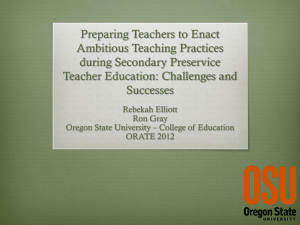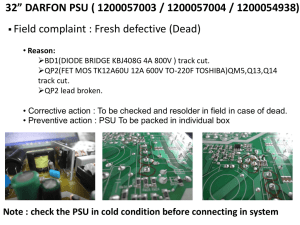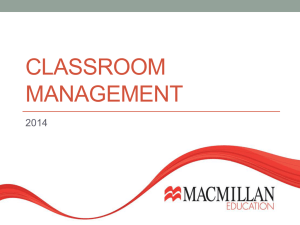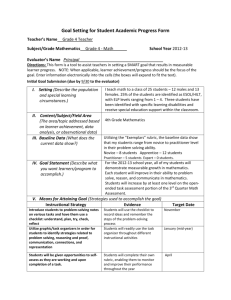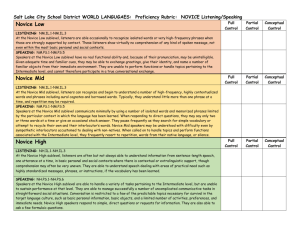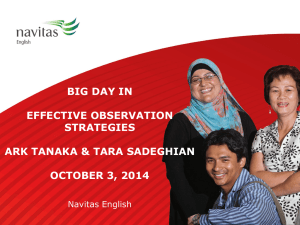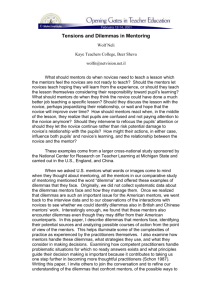SPLED 505 Proposal
advertisement
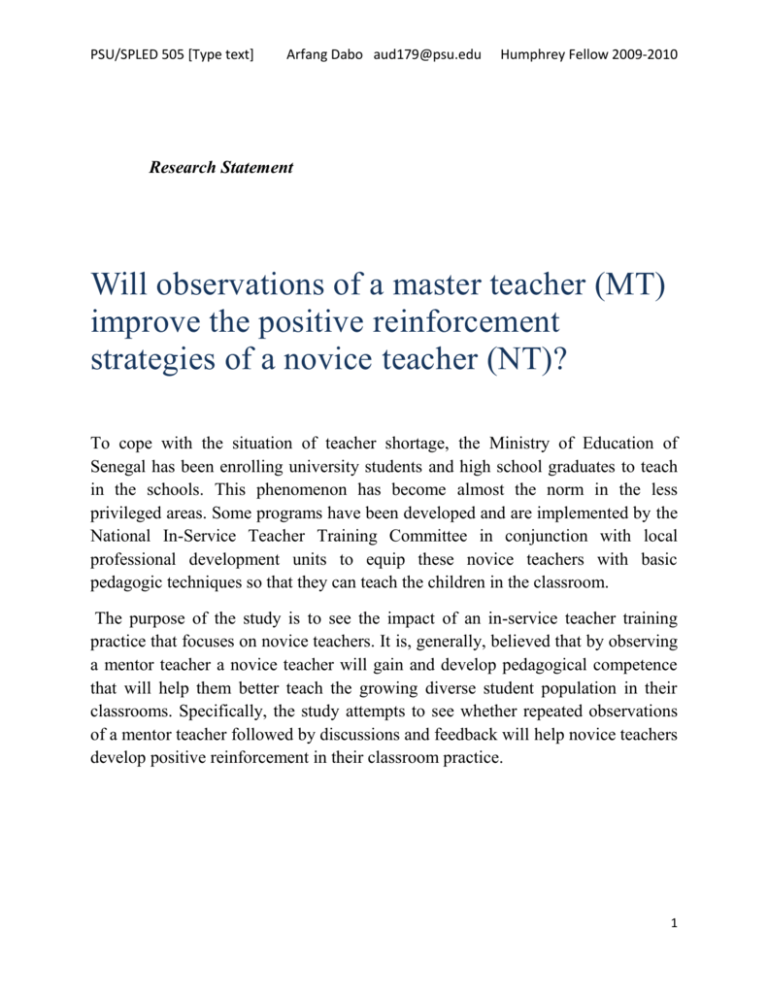
PSU/SPLED 505 [Type text] Arfang Dabo aud179@psu.edu Humphrey Fellow 2009-2010 Research Statement Will observations of a master teacher (MT) improve the positive reinforcement strategies of a novice teacher (NT)? To cope with the situation of teacher shortage, the Ministry of Education of Senegal has been enrolling university students and high school graduates to teach in the schools. This phenomenon has become almost the norm in the less privileged areas. Some programs have been developed and are implemented by the National In-Service Teacher Training Committee in conjunction with local professional development units to equip these novice teachers with basic pedagogic techniques so that they can teach the children in the classroom. The purpose of the study is to see the impact of an in-service teacher training practice that focuses on novice teachers. It is, generally, believed that by observing a mentor teacher a novice teacher will gain and develop pedagogical competence that will help them better teach the growing diverse student population in their classrooms. Specifically, the study attempts to see whether repeated observations of a mentor teacher followed by discussions and feedback will help novice teachers develop positive reinforcement in their classroom practice. 1 PSU/SPLED 505 [Type text] Arfang Dabo aud179@psu.edu Humphrey Fellow 2009-2010 Methods Participants Novice Teachers: Four novice teachers (NT) without any formal pre-service training will be selected to participate in the study. The participants will be initially observed and videotaped and eligibility will be determined by the deficiency of desirable instructional competence in their teaching. The novice teachers will be committed to the study but will be informed about the intervention and the target behavior. Mentor teachers: Four resident teacher advisors will be selected and trained to deliver the intervention. Observers: In addition to the four MT and the four NT, four observers will be recruited among the teacher advisers. They will be trained not only to observe and collect data but also to code at different phases of the study will be described in the procedures. Arrangements to reach inter-observer agreement will be made during the process of selection of mentor teachers and novice teachers. Setting The setting of the intervention will be either formal (e.g. classroom) or informal (e.g. staff room). All observations will take place in classrooms in different schools 2 PSU/SPLED 505 [Type text] Arfang Dabo aud179@psu.edu Humphrey Fellow 2009-2010 of different school districts, and possibly different regions to avoid imitation of treatment. The selected novice teacher will have to observe and job shadow the mentor teacher for tree times for three weeks. After each session, they novice teacher will sit with the mentor teacher for a discussion and feedback. NT can ask questions and MT is supposed to provide answers and explanation. The Design A multiple probe design will be utilized to collect data for three weeks. Data collection will comprise two phases. Phase one: The NT will observe the MT and collect data three times a week for three weeks. Phase two: After each week’s three observations, The NT will be observed teaching in their classrooms by the MT and the teacher advisers. Data will be then analyzed and compared to baselines and across participants to determine whether and to what extent observing a mentor teacher for three weeks will have an impact on a novice teacher’s instructional competence and classroom practice. Dependent Variable: The dependent variable in this study will be a desirable instructional competence the NTs will display in teaching their class. We mean by instructional competence Instructional prompts Instructional correction Praise Independent variable: The independent variable in this study will be the opportunity to observe a mentor teacher, discuss with them and receive feedback. 3 PSU/SPLED 505 [Type text] Arfang Dabo aud179@psu.edu Humphrey Fellow 2009-2010 We mean by observation watching a classroom instructional situation, discussing strategies with teacher, and looking at graded students work and discussing it. Observation and recording Observations of the MTs by the NTs will happen in the classrooms during a 45 minutes lesson. Observations of the NTS will happen in their own classrooms during a 45 minutes lesson. There will be two observers in each session and data collected for 20 minutes. Recordings will begin at the same time as observations but will last the whole lesson. A camera fixed on a tripod will be utilized for the recordings and it will be placed at the most appropriate spot to have a good coverage and avoid reactivity and distraction. At the end of each session the two observers will then watch the video recordings with the researcher and then compare them with the observation codes. 4


